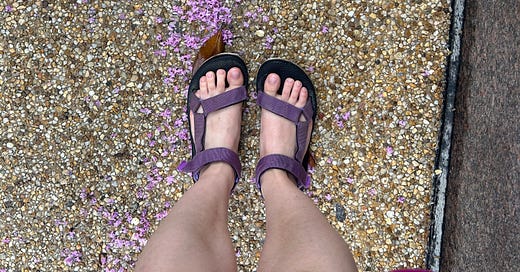June Recommendations
Looking at flowers: It’s no secret to readers of this newsletter that Washington DC is not one of my favorite cities among the places I’ve lived. But I am working hard to find things to love here, and one of them is the PLANTS. Though we are now entering flash-storm and heatwave season, now that I have lived here for a full year I have seen that the awful swamp hell of DC summer comes with some perks: namely, an extended, early, and luscious spring. I’ve been sitting outside on a balcony and in parks for a few months now, enjoying what is an unimaginably balmy spring for a girl raised in New England. And along with this weather comes a total riot of flowers. There are so many colors, textures, and smells! I am trying to, well, slow down and smell the flowers. I’d recommend it.
“We Need New Jewish Institutions” by Arielle Angel: This new essay in Jewish Currents captures the very real need for left Jewish spaces that focus not only on political work. I am blessed to spend time in the existing sorts of spaces she describes, and I am both personally and professionally acutely aware of the need for more structures to support this work. How many leftist teachers of Torah are highly trained, teach Torah that attracts large, engaged audiences, and still struggle to find consistent work, just for example? (This is where I say THANK YOU, PAID SUBSCRIBERS!!) (This is also where I say: hire me to teach in your organization or community! I am looking for more work!) Here’s a quote:
“When I spoke to Minneapolis-based rabbi Jessica Rosenberg, who is involved in the burgeoning Jewish Diaspora Movement, she emphasized that this story of the leap to rabbinic Judaism is often told with a dramatic jump cut: the fall of the Temple to the full yeshivas of the rabbis, omitting the “messy process” of the intervening half millenia or more. “We tell the story as if it was inevitable,” she said. “In fact, there was nothing inevitable about it.” Those hundreds of years, she told me, probably resembled our current moment in meaningful ways: small groups of people traveling around, trying things, attempting to shore up one hypothesis or another through practice—the minyans and study groups in “living rooms and backyards, the Shabbat service in a church or a Zen Center.” People doing what they feel “called to do in the places where they are, and that eventually overwhelming the centralized system of authority to become the normative thing.” But we don’t have 500 years. According to Rosenberg, the question now is how to “network and resource the living room,” maintaining the beauty of what is happening there while building toward a greater level of organization and power.”
I love the call to “network and resource the living room.” I’m excited about this work.
Asking your friends for help: It turns out that you are not a burden to the people who love you. If you ask, they will help you come up with a list of books to read on a long summer shabbos when you need it but that feels overwhelming; navigate signing up for Obamacare health insurance with you; feed you dinner; invite you to co-work so you don’t stagnate indoors; and onward, and onward, and onward, in a series of miraculous and mundane gifts. Highly recommended.
Keep reading with a 7-day free trial
Subscribe to Approaching to keep reading this post and get 7 days of free access to the full post archives.



